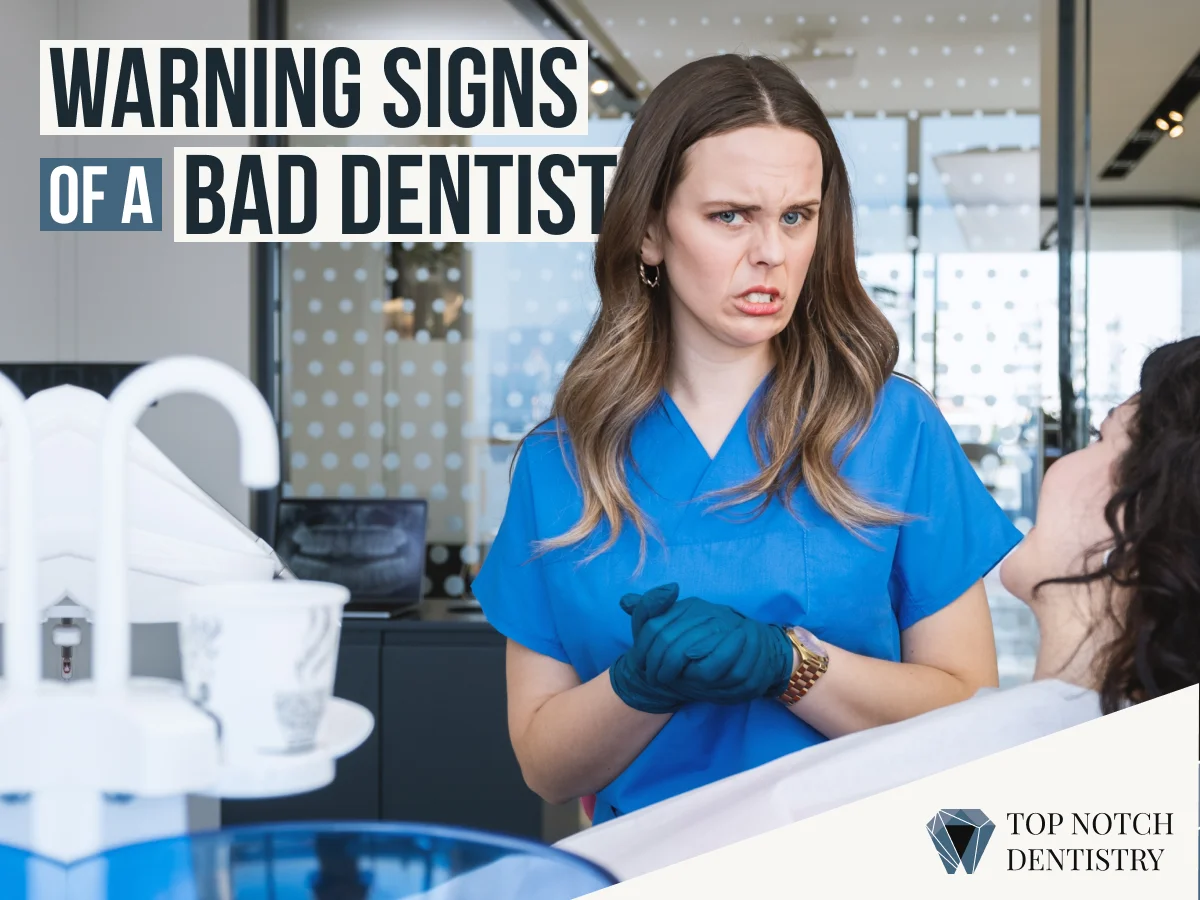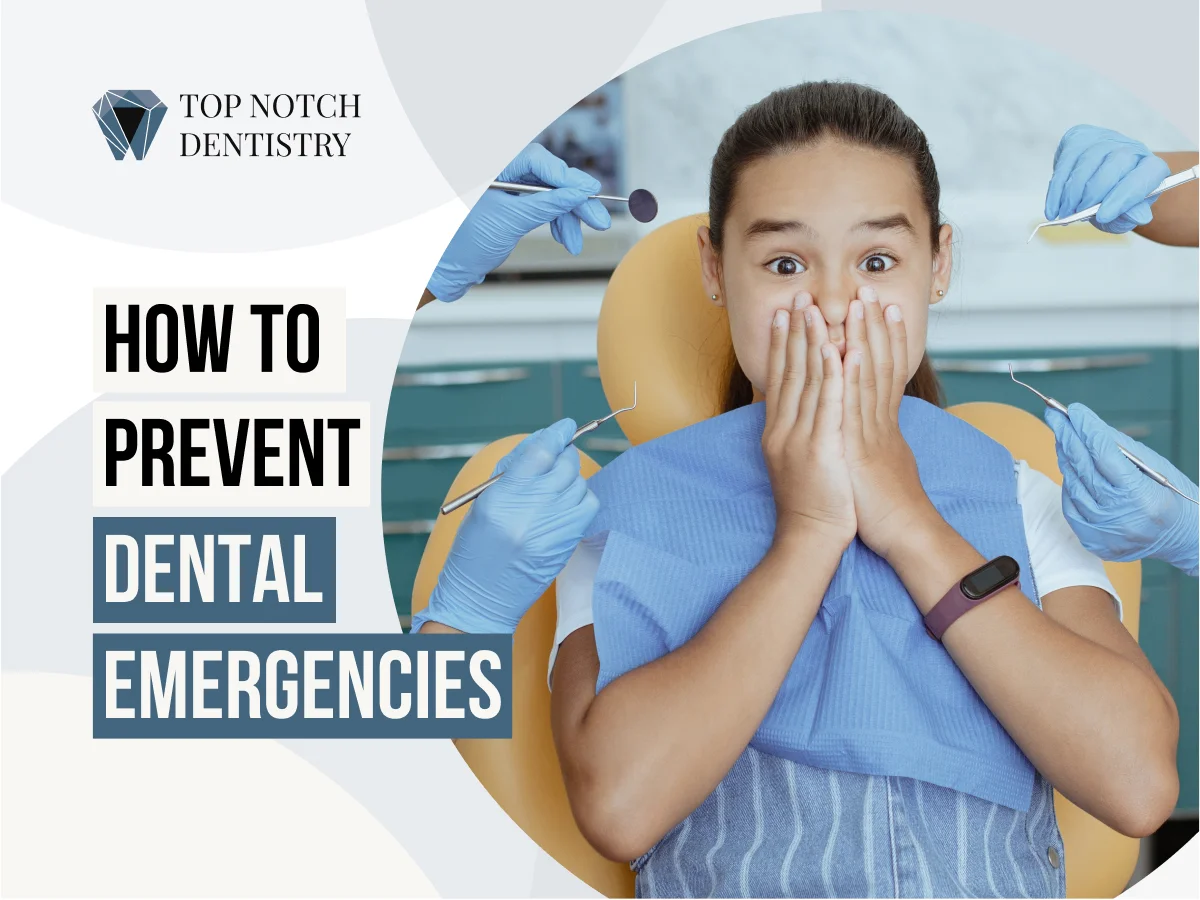
Choosing the right dentist is crucial for maintaining your oral health and peace of mind. But how do you know if your practice truly provides the care you deserve? Unfortunately, not all dentists operate with the best intentions. The National Practitioner Data Bank records that in 2023, there were 2,496* reports of dental malpractice in the US. With this data in mind, recognizing the early warning signs of a bad dentist can save you from unnecessary treatments, financial stress, and long-term health risks.
In this guide, we’ll uncover the red flags you should never ignore. This will empower you to make informed decisions about your dental care and ensure your smile is in the right hands. Keep reading to learn more.
15 Warning Signs of a Bad Dentist
A bad dentist can have many detrimental effects on your oral health. This makes it essential to identify any potential warning signs of dental malpractice early in your dental journey. From frequent misdiagnoses to a lack of proper hygienic practices and overall unprofessional behavior, we’ve outlined the top red flags you should look out for.
Your Dentist Shames You for Poor Oral Hygiene
A good dentist offers constructive feedback and practical solutions for improving your oral hygiene rather than shaming you. If your dentist berates you for your oral health habits, their conduct could be considered to be signs of a bad dental hygienist. Effective dentists aim to educate and empower their patients, not to make them feel guilty or embarrassed.
Your Dentist Recommends Unnecessary or Over-the-Top Procedures
Always be wary of dentists who frequently suggest expensive or invasive procedures that don’t seem necessary. If you’re thinking, ‘Is my dentist scamming me?’ It’s well worth requesting a second opinion before committing to their recommended treatment.
A trustworthy dentist will base recommendations on genuine need and will discuss all available options, ensuring transparency and informed consent. If you feel pressured into treatments that seem excessive or unnecessary, it might indicate a conflict of interest or lack of integrity.
Your Dentist Promotes Suspiciously Cheap Deals or Discounts
While promotions can be beneficial, unusually low prices may signal compromised quality or hidden agendas. A reputable dentist should offer transparent pricing and value for services. If you’re attracted to a dentist based solely on cut-rate deals, ensure that the quality of care and professional standards are not being sacrificed.
Your Dentist Shows Little Empathy for Your Dental Anxiety
Dental anxiety is common, and a skilled dentist should address it with understanding and patience. If your dentist dismisses your concerns or seems uninterested in helping you manage anxiety, it may indicate a lack of empathy or professionalism. In this case, look for a dentist who listens to your concerns, offers reassurance, and adapts treatments to meet your emotional needs.
Your Dentist Insists on Additional Procedures You Don’t Need
A competent dentist should provide a clear rationale for any additional treatments and respect your decision if you choose to decline. If you feel pressured into unnecessary treatments, it’s important to seek a second opinion and evaluate whether your dentist’s motives are in your best interest.
Your Dentist Discourages You From Seeking a Second Opinion
A trustworthy dentist will support your decision to seek a second opinion and view it as a positive step in ensuring you receive the best possible care. Be cautious if your dentist tries to dissuade you from consulting another professional or dismisses your concerns about getting another viewpoint. This may indicate a lack of confidence in their own diagnosis or a desire to limit scrutiny of potentially bad dental work.
Your Dentist Doesn’t Share Diagnostic Results or Clarify Treatment Plans
Transparency is key in facilitating a strong patient-dentist relationship. In other words, your dentist should clearly communicate diagnostic results and thoroughly explain treatment options, addressing any concerns or questions you may have. If your dentist withholds information or fails to clarify the details of your treatment plan, it could be a sign of poor communication. However, it may be an attempt to obscure important information about your dental care.
Your Dentist Relies on Old-Fashioned Methods or Equipment
Modern dental practices should use up-to-date technology and techniques to ensure the best outcomes for patients. If your dentist consistently relies on outdated equipment or traditional methods without justification, it may affect the quality of your care, resulting in inefficient and ineffective treatments.
Your Dentist Has a Bad Online Reputation
While online reviews should be taken with a grain of salt, a consistently negative reputation across multiple platforms is worth noting. As frequent complaints about the same issues can be a warning sign of potential problems within a practice, it’s important to thoroughly research your dentist’s online presence. You may also find it helpful to read reviews to gauge other patients’ experiences.
Your Dentist Doesn’t Value Your Time
Respect for your time is crucial in any professional setting. If your dentist consistently keeps you waiting for extended periods or has a disorganized schedule, it may reflect poorly on their practice management. A reliable dentist values your time and maintains punctuality, ensuring your appointments are handled efficiently and professionally.
Your Dentist Exhibits Unprofessional Behavior
Your dentist should maintain a respectful and courteous demeanor at all times.Unprofessional behavior, such as being rude, dismissive, or overly casual, can undermine your confidence in the practice. If you observe inappropriate or unprofessional behavior, it’s important to consider whether this could impact the quality of your care.
Your Dentist Lacks Sufficient Experience or Qualifications
A lack of experience or credentials can affect the quality of care you receive. This means that it’s essential to ensure your dentist has the appropriate qualifications and experience for the treatments they offer. A reputable dentist will be open about their qualifications and able to provide evidence of their expertise, including their educational background, certifications, and years in practice.
Your Dentist Has Frequent Billing Issues
Billing problems, such as overcharges, unexplained fees, or incorrect billing statements, can indicate poor practice management. Your dentist should provide clear and accurate billing information and resolve any issues promptly. Frequent or unresolved billing discrepancies may suggest disorganization or a lack of transparency in their financial practices.
Your Dentist Ignores or Downplays Dental Symptoms
Your dentist should take all reported symptoms seriously and conduct thorough evaluations. If your dentist consistently ignores or minimizes your dental concerns, it could lead to unresolved issues or worsening conditions. Effective communication and a comprehensive approach to diagnosing and treating symptoms are crucial for maintaining good oral health.
Your Dentist's Office Has Unclean Conditions
A clean and hygienic office environment is essential for preventing infections and ensuring patient safety. If you notice that the office is consistently dirty or poorly maintained, it may reflect a lack of attention to hygiene standards. A reputable dentist, on the other hand, will prioritize cleanliness and follow strict protocols to maintain a safe and sanitary practice.
What to Do if You’re Unhappy With Your Dentist
If you are dissatisfied with your current dentist, it’s essential to approach the situation thoughtfully to ensure your concerns are addressed. We recommend following these basic steps:
- Open Communication: Start by having a candid conversation with your dentist about your concerns. Addressing the issue directly can often lead to a resolution. Be specific about what is troubling you, whether it is treatment recommendations, office behavior, or communication issues. A good dentist should be open to feedback and willing to discuss and resolve problems amicably.
- Seek a Second Opinion: If you’re uncertain about the advice or treatment provided, obtaining a second opinion can provide clarity. Consulting another qualified dentist to review your case and offer an independent perspective can help you confirm whether the recommended treatments are appropriate.
- Know Your Patient Rights: Understanding your rights as a patient can empower you to advocate for yourself effectively. Therefore, it’s important to familiarize yourself with patient rights and protections to ensure that any issues are addressed according to established standards and practices.
- Document Your Experience: Keep detailed records of your interactions with your dentist, documenting dates, treatments discussed, and any issues encountered. This information can be invaluable if you need to escalate the matter or file a formal complaint later.
- File a Complaint: If your concerns remain unresolved after addressing them with your dentist, consider filing a complaint with the dentist’s office or a professional dental board. However, when doing so, be sure to provide clear and detailed information to support your case. Most dental boards have formal processes for handling patient complaints and can offer guidance on the next steps to take.
- Explore New Dentists: If it becomes clear that your current dentist is not meeting your needs, it might be time to find a new one. This will involve conducting thorough research to identify potential new dentists, reading patient reviews, checking their qualifications, and scheduling consultations to ensure they align with your expectations and needs.
- Maintain Your Oral Health: Throughout this process, continue to prioritize your oral health, following good dental hygiene practices and keeping up with regular checkups and cleanings. This will help ensure your dental health remains intact while you transition to a new provider.
By taking these steps, you can address your dissatisfaction effectively and ensure you receive the quality dental care you deserve. If you feel you need to change your dentist we have an article that will walk you through the process.
How to Research and Vet a Dentist
Choosing the right dentist is crucial for your long-term dental health and peace of mind. Fortunately, a little research can go a long way in ensuring you find a professional, skilled, and trustworthy provider. Here’s how you can effectively vet a dentist before making a decision:
- Check Credentials and Experience: Ensure the dentist holds the necessary licenses and certifications, verified through your state’s dental board. Evaluating their experience, particularly with procedures relevant to your needs is also important.
- Read Reviews and Ask for Recommendations: Online reviews and personal recommendations from friends or family provide valuable insights into the dentist’s reputation, helping you identify potential red flags or consistently positive experiences.
- Evaluate Office Atmosphere and Technology: Visit the office to assess cleanliness, organization, and the use of modern technology.Up-to-date equipment often signals a commitment to effective and safe treatment.
- Gauge Communication and Rapport: During your initial interaction, consider how well the dentist listens, explains treatment options, and addresses your concerns. A good dentist fosters trust through clear, patient-centered communication.
- Verify Payment Options and Insurance: Confirm that the dentist accepts your insurance, offers flexible payment plans, and provides clear billing practices to avoid surprise costs later.
By following these steps, you can find a dentist who not only meets your needs but also provides a positive and supportive dental experience.
Final Thoughts on Warning Signs of a Bad Dentist
Recognizing the warning signs of a bad dentist is essential for safeguarding your dental health and ensuring you receive quality care. From unprofessional behavior to recommending unnecessary procedures, dental red flags can impact not only your oral health but also your overall well-being. As a result, if you’ve experienced any of the signs mentioned, it may be time to reconsider your current dentist and explore better options.
At Top Notch Dentistry of Dallas, we prioritize transparency, patient comfort, and exceptional care, delivering personalized, trustworthy dental services that meet the highest standards of professionalism. Whether you’re looking for routine checkups or more complex treatments, you can trust that you’ll be treated with respect, integrity, and the latest dental techniques.


